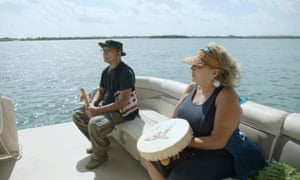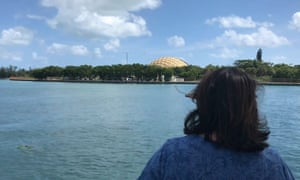Native Americans honor Lolita the orca 50 years after capture: ‘She was taken’ | Environment
[ad_1]
Sign up for monthly updates on America’s public lands.
On the 50th anniversary of an orca’s captivity, members of the Lummi Nation traveled to Florida to hold ceremony outside the Miami aquarium where the whale is being kept.
The southern resident orca, whom the Washington state-based nation calls Sk’aliCh’elh-tenaut, was taken from waters off Penn Cove in Lummi territory when she was four years old.
The whale arrived at the Miami Seaquarium on 24 September 1970, where she is known as Lolita. The orca is now 54 – out-surviving a dozen other southern residents that were captured at the same time as she was.
According to Orca Network, five southern residents died during the capture five decades ago, while seven were sold to marine parks around the world, all of which died in captivity except Sk’aliCh’elh-tenaut.
Raynell Morris (Squil-le-he-le) and Ellie Kinley (Tah-Mahs) held ceremonies for Sk’aliCh’elh-tenaut on Wednesday and Thursday.

“We felt it was critical … to give her prayer, love and support, to let her know she is not forgotten,” Morris said Thursday.
On Wednesday, Morris and Kinley – along with Samuel Tommie of the Seminole Tribe of Florida – boated to waters in view of the Miami Seaquarium.
After laying a wreath of cedar brought from the Pacific Northwest into the ocean, Morris, Kinley and Tommie played a flute song and drummed for Sk’aliCh’elh-tenaut, mournfully calling her name across the water in hopes that the sound would carry to her.
“We promised when you hear a drum, it’s your heartbeat, it’s our heartbeat,” Morris called.
“You know you’re not alone, we love you, your people love you …We’ll bring you home.”
Kinley has previously compared the capture of Sk’aliCh’elh-tenaut to the federal government’s efforts to assimilate Native American children in church-run boarding schools.
“She was taken from her family and her culture when she was just a child, like so many of our children were taken from us and placed in Indian boarding schools,” she said in July.
In Lummi’s language, the word for killer whale “qwe’lhol’mechen,” means “our relatives who live under the sea.”
For years, the nation has been trying to bring Sk’aliCh’elh-tenaut back to the Salish Sea to gradually rehabilitate her and introduce her back into her family pod.
In captivity, Sk’aliCh’elh-tenaut still sings a whale song specific to the her whale family, known as the L-pod, according to Lummi, and her mother is still alive in the wild.
Representatives from the nation have been working with experts on a comprehensive “retirement plan” for the orca that involves transporting her via flatbed truck to a netted-off cove where the L-pod often travels.
Representatives from the Miami Seaquarium are against that plan, saying at 54-years-old, the orca is better off staying in captivity.
Miami Seaquarium curator Chris Plante said in a written statementthat the whale’s longevity is a testament to the “excellent care” she receives daily from animal training and veterinary care staff over five decades.
“She is a remarkable animal and we are devoted to her,” Plante said.
“Instead of focusing on a perilous move that could endanger the life of Lolita, a 54-year-old orca, the attention of those concerned should be on the plight of the critically endangered orcas currently residing in Puget Sound.”

Recently, Lummi has held ceremonial feedings for endangered southern residents in their territory, which have been struggling to find chinook salmon to fit their particular diets.
However, the nation also continues to focus on Sk’aliCh’elh-tenaut in particular.
Morris and Kinley have recently acquired legal representation from the Earth Law Centre as they seek to sue the Miami Seaquarium.
Earth Law Centre executive director Grant Wilson said the Miami Seaquarium’s failure to return the orca to the Salish Sea violates Lummi’s Indigenous rights for their “sacred family member”.
“This is a tragic story that has lasted 50 long, grueling years,” Wilson said. “But there are still a couple of chapters left.”